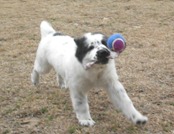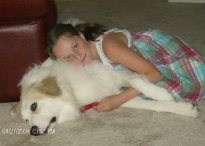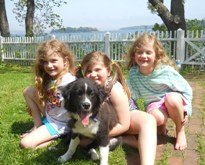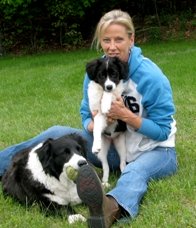|
Dog Personality Who is That?Whether you’re looking for that special puppy or you currently have a dog, understanding the basic dog personality types can guide you in choosing the right puppy and or having a harmonious, loving relationship with your current dog. Dogs can have very different personality types which have been identified, providing insight into how compatible the dog/puppy may be with your lifestyle. Personality types can be strongly influenced by a dog’s genetic make-up. Do keep in mind that there are other factors that influence behavior: The mother’s health during pregnancy, the mother’s temperament, the puppy’s diet, health, environment, socialization and hormones. I encourage anyone when looking to understand a dog/puppies personality to put aside for a moment the influence that genetics, health and their environment may have. Step back and see who the dog/puppy truly is rather than what you might expect. I have had three puppies from the same litter with three very different temperament types! They may or may not be what you expect but they are all uniquely themselves. 
Here are several basic dog personality types which have been identified. Adaptable This personality type is easy to handle, has a cooperative nature and will be easy to train, gentle and affectionate. These dogs will make great family pets. Confident This dog shows independence, is confident and can be dominant as well. They will be best suited with an owner who is clear and consistent with their training. This dog will accept human leadership best with the correct training, gaining your dogs trust and respect. Independent This dog has a low need for human friendship and tends not to be affectionate. To respond or perform this type will not be motivated by human attachment. The owner of needs to accept that this is who the dog is and give him the space that he needs. Outgoing This dog is friendly and sociable. He made need outlets for his energy. He is fairly trainable and adjusts well to change. Insecure A lack of self confidence and submissive behavior requires lots of companionship and a stable and predictable environment. This personality type will bond with its owner. Without a patient and gentle owner this dog can become very withdrawn, shy and fearful. Aggressive Here’s a dog that is highly dominant and resists human leadership. Recognize their aggressive and dominant behaviors early on and t reat them with respect and clear communication. These dogs need regular exercise and a consistent training program to redirect their focus. Matching your dog’s training to his personality type can be instrumental in how your dog adapts and gets along with the family. By being aware of the basic personality types it’s becomes obvious that dogs can have a range of behaviors and a propensity to connect deeply or superficially with their owners. Good training that matches the dog’s personality type may help in negating the behaviors that may be conflicting with your current lifestyle. 
These styles of interacting in the world provide some guidelines to the training that will be beneficial for your dog and your relationship. The happy-go-lucky laid back type are good for novice dog owners in part because they tend to be thick skinned and mistakes will be well tolerated. They do well in active households and adapt well to changes in home situations. Training needs to be very straightforward, consistent with repeated boundaries set and enforced. Examples of breeds with these personality traits, Golden Retrievers, Labrador Retrievers, Bernese Mountain Dog
The Highly Sensitive type is very smart and tuned into their owner and environment. They can read you extremely well and are sensitive to changes. They have a very high degree of the need to please you so all interactions need to be aware of their sensitive nature. These dogs respond to clear, kind training. Training needs to be soft with clear. Hash treatment will crush the dog and you will, have a dog that become fearful. They tend not to do well in chaotic environments and you may find them under the bed! Examples of breeds with these personality traits: Border Collies, Australian Shepherds, Pit Bull Terriers, and German Shepherds. Independent thinkers can make-up their own minds and have ideas as to what is ok behavior. They are less interested in reading you but rather make their own decisions. It’s up to you to provide some guidelines and training that is firm and consistent. Training Consistent and enforced training will help these dogs accept and understand the rules of the house. Be careful not to treat these dogs roughly because it may backfire with them pushing back. Breeds look for the behavior in each individual dog.
|
Your New Best Friend
Testimonials

Dutchess
I wanted to let you know how well she is doing. She is such a great dog. We love her so much, I can't
Imagine our lives without her!! We are thankful that you had her and we found her with you.
Thank you for sending us the light in our lives!
Pam Thurlow and family

Sox
Hi Susan. Sox is doing great in his new environment. The children love him as you can see in the picture. He is a good boy, and quite the love. He is really smart too. Thanks for the health record. I passed your website along to a few people in Maine already.
Kim-Slade-Brier and Family

Tipsy She is a great little girl, very sweet and naughty just the way I like it. So thank you for doing this work of bringing dogs and people together! The puppy is a delight! She is very sweet and so smart! My kids and husband adore her. In short, she has been a wonderful addition to our family. Thanks Susan! Judy McMahon and family
